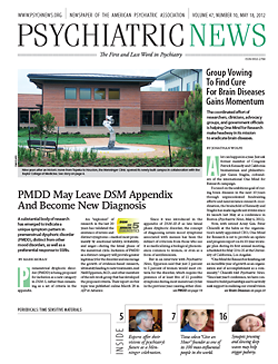Despite half a century of drug discovery, all medications available to treat schizophrenia rely on the same mechanism—blocking dopamine receptors.
So a team of British and American scientists decided that if new, more effective treatments for schizophrenia are to be developed, the precise role that dopamine plays in the brains of individuals with schizophrenia needs to be identified.
They have concluded that the problem is excessive synthesis of dopamine, they reported online April 2 in the Archives of General Psychiatry.
The lead investigator, Oliver Howes, Ph.D., group head of the Department of Psychosis Studies at the Institute of Psychiatry, King’s College, London, and his colleagues first searched PubMed, PsycINFO, and MEDLINE electronic databases to find published studies in which researchers used PET and SPECT imaging to evaluate dopamine function in the brains of individuals with schizophrenia and the brains of control-group subjects. They found 44 such studies, encompassing some 1,200 subjects—600 with schizophrenia and 600 controls.
Howes and his team then conducted a meta-analysis of these studies. “We excluded studies of dopamine receptors where patients were taking antipsychotics, because drug binding to receptors is well established to alter receptor availability,” Howes told Psychiatric News. “We did not exclude studies of other aspects of the dopamine system that included patients taking antipsychotics. However, most of the studies were of patients who were not taking antipsychotics, and the results remained the same after excluding studies of patients who were taking antipsychotics.”
The meta-analysis showed that the big difference between the schizophrenia subjects and the control subjects was not in the availability of dopamine receptors, nor in the availability of dopamine transport, but in dopamine synthesis. The schizophrenia subjects made more dopamine than the controls did.
“The most surprising finding was the size of the presynaptic dopamine abnormality,” Howes said. “For years schizophrenia researchers have gotten used to brain findings in schizophrenia being small, so it was surprising and fascinating to find such a large effect.”
Thus, Howes and his group believe that excessive dopamine synthesis constitutes the most important dopamine abnormality in schizophrenia and that efforts to find novel, more effective drugs for schizophrenia should focus on countering this synthesis, not on blocking dopamine receptors, which are further downstream in the schizophrenia disease process.
They acknowledged, however, that finding a drug that selectively dampens dopamine synthesis will be a challenge, since dopamine and the neurotransmitter norepinephrine share part of the same synthesis pathway. Thus, a drug that interferes with dopamine synthesis also risks affecting norepinephrine synthesis, leading to undesirable side effects. “I am not aware of any developing drugs that directly alter dopamine synthesis,” said Howes, “but several [pharmaceutical companies] are developing compounds that indirectly act to reduce dopamine synthesis.”
The research was funded by the United Kingdom Medical Research Council and Biomedical Research Council.


